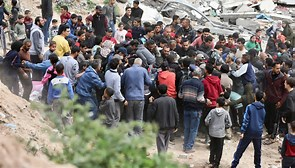The humanitarian situation in Gaza has reached a critical point as the United Nations warns of an impending famine in the northern regions. The World Food Program’s alarming report indicates that 70% of the population is facing catastrophic levels of hunger, with the possibility of half of Gaza’s 2.3 million residents being pushed to the brink of starvation if the conflict escalates.
Israeli forces have conducted another raid on Gaza’s largest hospital, Shifa Hospital, amidst claims of Hamas militants using the facility for operations. This has raised international concerns and calls for Israel to facilitate the entry of aid and open more crossings to address the dire needs of the Gazan population.
The European Union’s top diplomat has described the looming famine as “entirely man-made,” pointing to the use of starvation as a weapon of war. Aid groups emphasize the necessity of consistent food aid, access to clean water, and healthcare to avert the crisis.
As the war displaces 80% of Gaza’s population, the region’s infrastructure is under severe strain, with many residents resorting to eating animal feed. The international community continues to push for a ceasefire and increased humanitarian aid to prevent a large-scale famine in Gaza.




Comments
Post a Comment